Operations Management Report: Analyzing M&S Leadership and Strategy
VerifiedAdded on 2021/01/07
|8
|2101
|393
Report
AI Summary
This report provides a comprehensive analysis of operations management at Marks & Spencer (M&S). It explores key approaches such as Six Sigma, lean production, and queuing theory, and their impact on improving efficiency and productivity. The report examines the roles of leaders and managers in process design, resource allocation, and achieving business objectives. It highlights the importance of operational management in achieving profitability, customer satisfaction, and maintaining a competitive edge. Furthermore, the report discusses the factors affecting operational management, including customer service, global competition, and technological advancements, and evaluates the influence of these factors on the business environment and wider community. The role of Corporate Social Responsibility (CSR) and its impact on ethical values and company reputation is also discussed. The report concludes by summarizing the key findings and emphasizing the significance of effective operations management for M&S's success.
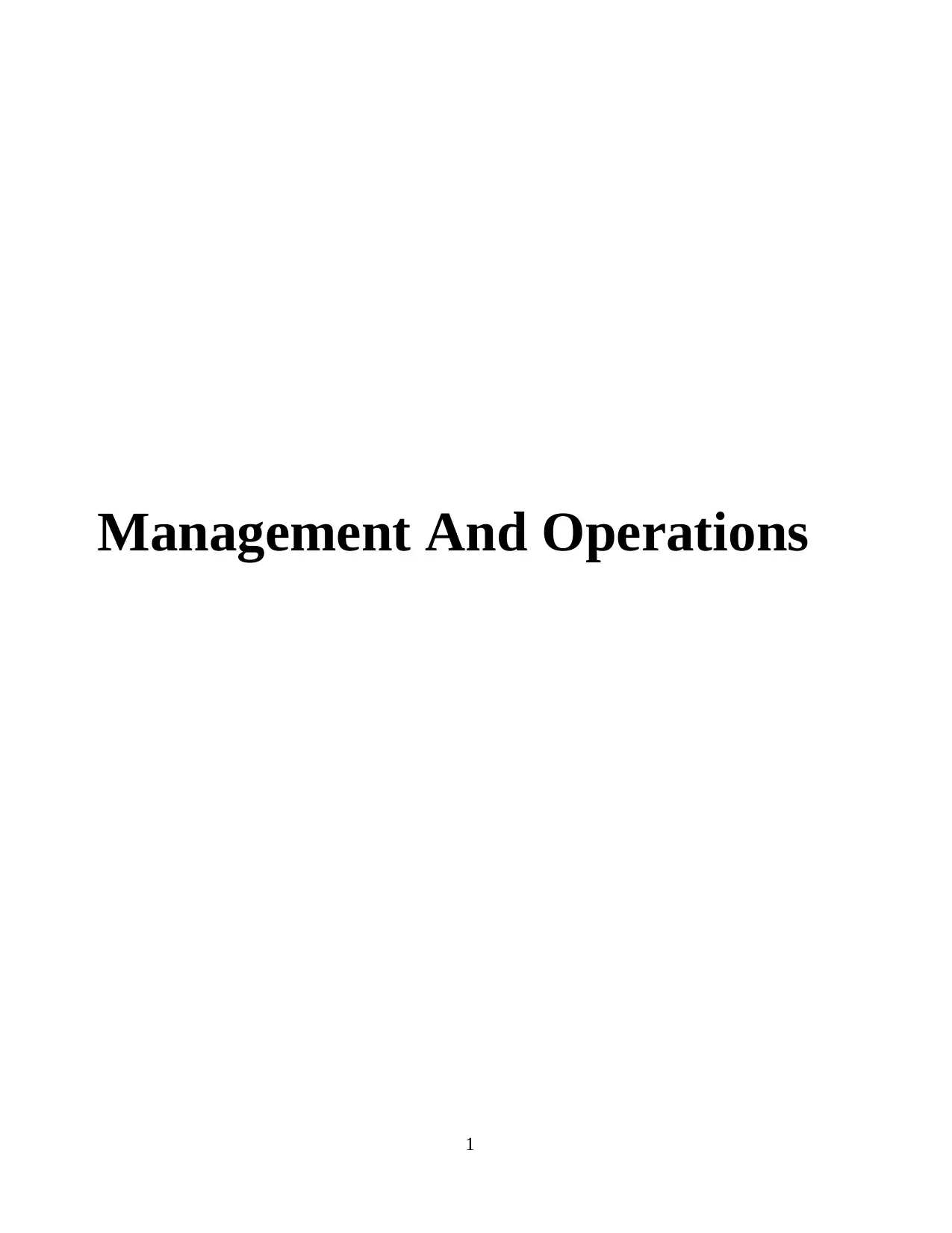
Management And Operations
1
1
Paraphrase This Document
Need a fresh take? Get an instant paraphrase of this document with our AI Paraphraser
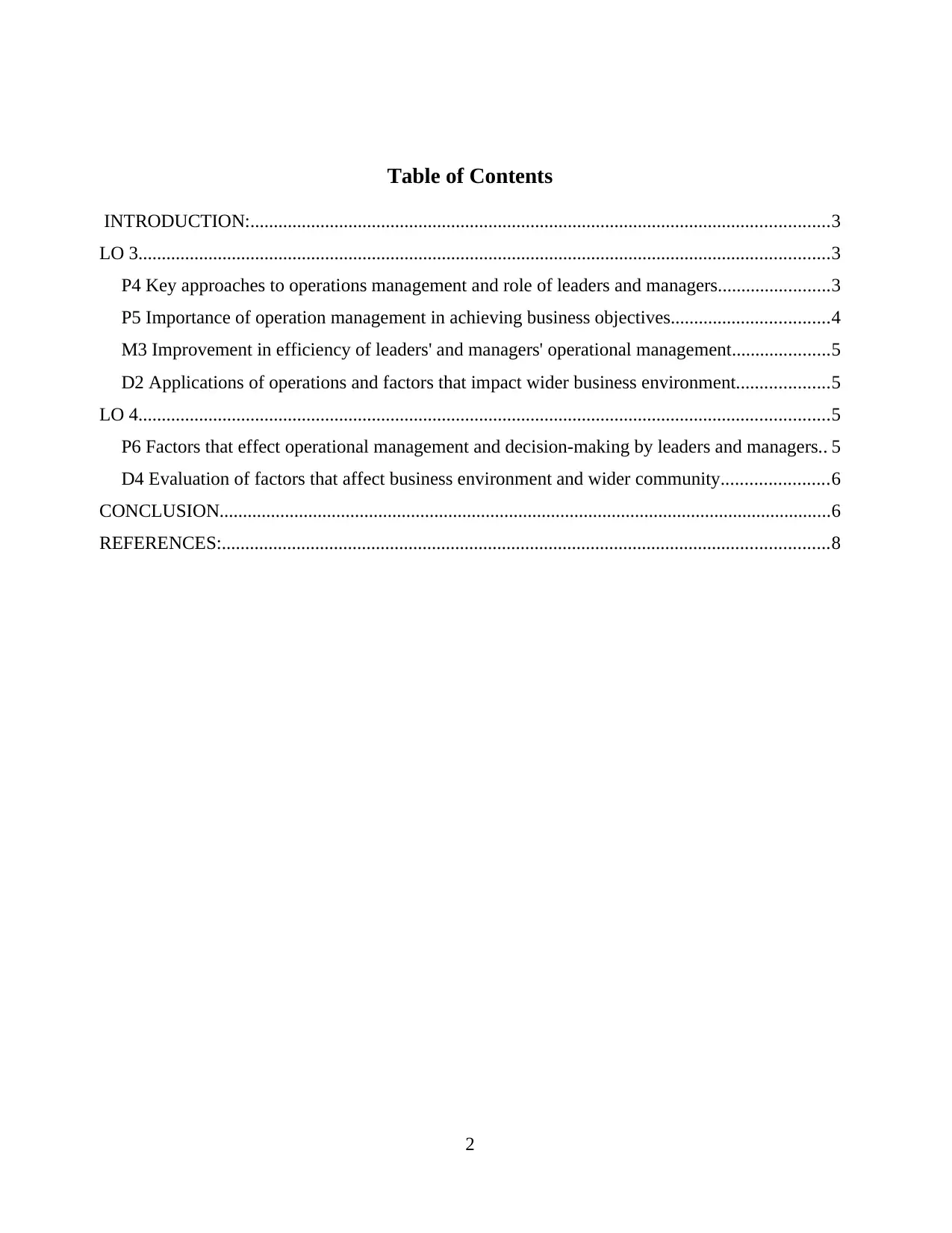
Table of Contents
INTRODUCTION:............................................................................................................................3
LO 3....................................................................................................................................................3
P4 Key approaches to operations management and role of leaders and managers........................3
P5 Importance of operation management in achieving business objectives..................................4
M3 Improvement in efficiency of leaders' and managers' operational management.....................5
D2 Applications of operations and factors that impact wider business environment....................5
LO 4....................................................................................................................................................5
P6 Factors that effect operational management and decision-making by leaders and managers.. 5
D4 Evaluation of factors that affect business environment and wider community.......................6
CONCLUSION...................................................................................................................................6
REFERENCES:..................................................................................................................................8
2
INTRODUCTION:............................................................................................................................3
LO 3....................................................................................................................................................3
P4 Key approaches to operations management and role of leaders and managers........................3
P5 Importance of operation management in achieving business objectives..................................4
M3 Improvement in efficiency of leaders' and managers' operational management.....................5
D2 Applications of operations and factors that impact wider business environment....................5
LO 4....................................................................................................................................................5
P6 Factors that effect operational management and decision-making by leaders and managers.. 5
D4 Evaluation of factors that affect business environment and wider community.......................6
CONCLUSION...................................................................................................................................6
REFERENCES:..................................................................................................................................8
2
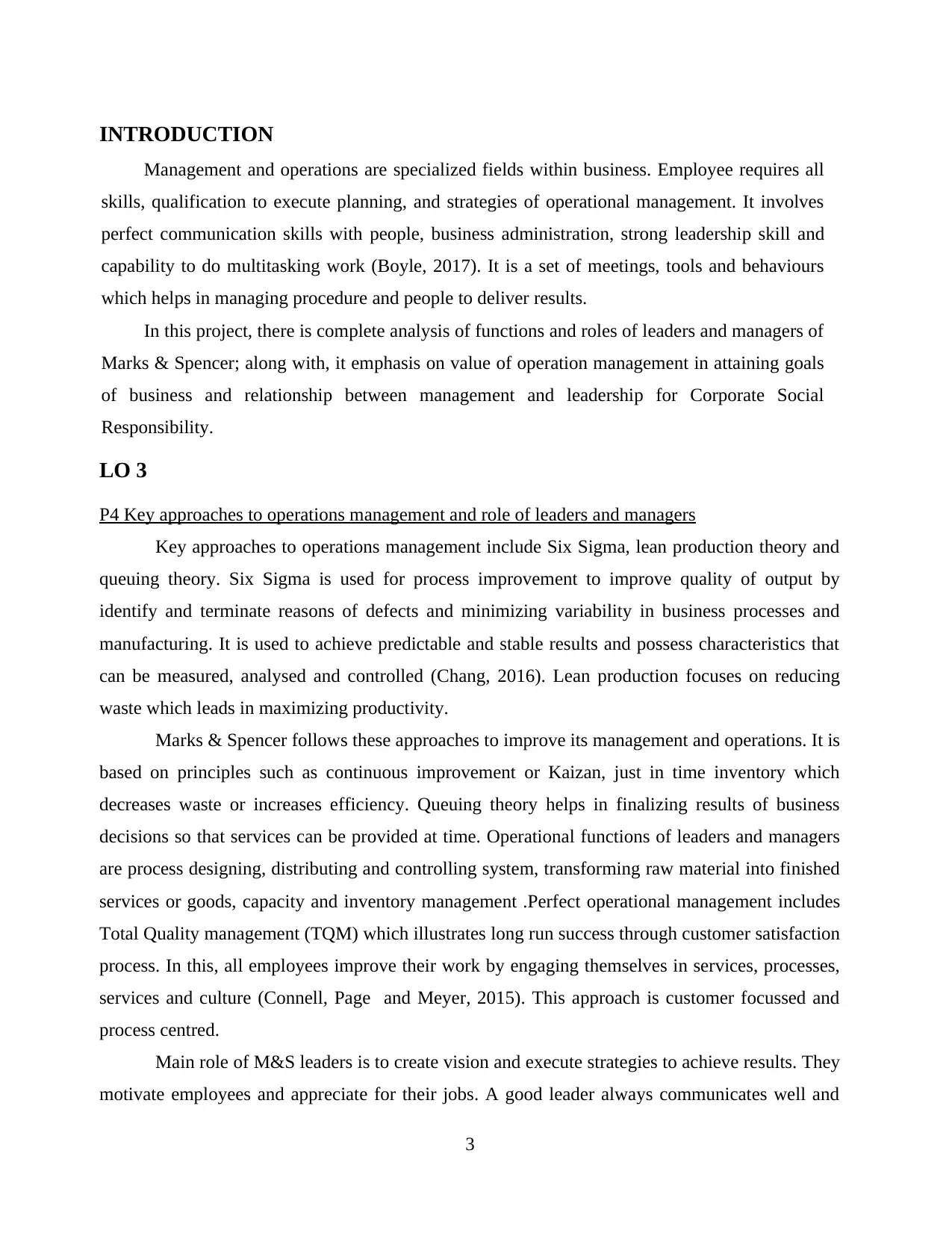
INTRODUCTION
Management and operations are specialized fields within business. Employee requires all
skills, qualification to execute planning, and strategies of operational management. It involves
perfect communication skills with people, business administration, strong leadership skill and
capability to do multitasking work (Boyle, 2017). It is a set of meetings, tools and behaviours
which helps in managing procedure and people to deliver results.
In this project, there is complete analysis of functions and roles of leaders and managers of
Marks & Spencer; along with, it emphasis on value of operation management in attaining goals
of business and relationship between management and leadership for Corporate Social
Responsibility.
LO 3
P4 Key approaches to operations management and role of leaders and managers
Key approaches to operations management include Six Sigma, lean production theory and
queuing theory. Six Sigma is used for process improvement to improve quality of output by
identify and terminate reasons of defects and minimizing variability in business processes and
manufacturing. It is used to achieve predictable and stable results and possess characteristics that
can be measured, analysed and controlled (Chang, 2016). Lean production focuses on reducing
waste which leads in maximizing productivity.
Marks & Spencer follows these approaches to improve its management and operations. It is
based on principles such as continuous improvement or Kaizan, just in time inventory which
decreases waste or increases efficiency. Queuing theory helps in finalizing results of business
decisions so that services can be provided at time. Operational functions of leaders and managers
are process designing, distributing and controlling system, transforming raw material into finished
services or goods, capacity and inventory management .Perfect operational management includes
Total Quality management (TQM) which illustrates long run success through customer satisfaction
process. In this, all employees improve their work by engaging themselves in services, processes,
services and culture (Connell, Page and Meyer, 2015). This approach is customer focussed and
process centred.
Main role of M&S leaders is to create vision and execute strategies to achieve results. They
motivate employees and appreciate for their jobs. A good leader always communicates well and
3
Management and operations are specialized fields within business. Employee requires all
skills, qualification to execute planning, and strategies of operational management. It involves
perfect communication skills with people, business administration, strong leadership skill and
capability to do multitasking work (Boyle, 2017). It is a set of meetings, tools and behaviours
which helps in managing procedure and people to deliver results.
In this project, there is complete analysis of functions and roles of leaders and managers of
Marks & Spencer; along with, it emphasis on value of operation management in attaining goals
of business and relationship between management and leadership for Corporate Social
Responsibility.
LO 3
P4 Key approaches to operations management and role of leaders and managers
Key approaches to operations management include Six Sigma, lean production theory and
queuing theory. Six Sigma is used for process improvement to improve quality of output by
identify and terminate reasons of defects and minimizing variability in business processes and
manufacturing. It is used to achieve predictable and stable results and possess characteristics that
can be measured, analysed and controlled (Chang, 2016). Lean production focuses on reducing
waste which leads in maximizing productivity.
Marks & Spencer follows these approaches to improve its management and operations. It is
based on principles such as continuous improvement or Kaizan, just in time inventory which
decreases waste or increases efficiency. Queuing theory helps in finalizing results of business
decisions so that services can be provided at time. Operational functions of leaders and managers
are process designing, distributing and controlling system, transforming raw material into finished
services or goods, capacity and inventory management .Perfect operational management includes
Total Quality management (TQM) which illustrates long run success through customer satisfaction
process. In this, all employees improve their work by engaging themselves in services, processes,
services and culture (Connell, Page and Meyer, 2015). This approach is customer focussed and
process centred.
Main role of M&S leaders is to create vision and execute strategies to achieve results. They
motivate employees and appreciate for their jobs. A good leader always communicates well and
3
⊘ This is a preview!⊘
Do you want full access?
Subscribe today to unlock all pages.

Trusted by 1+ million students worldwide
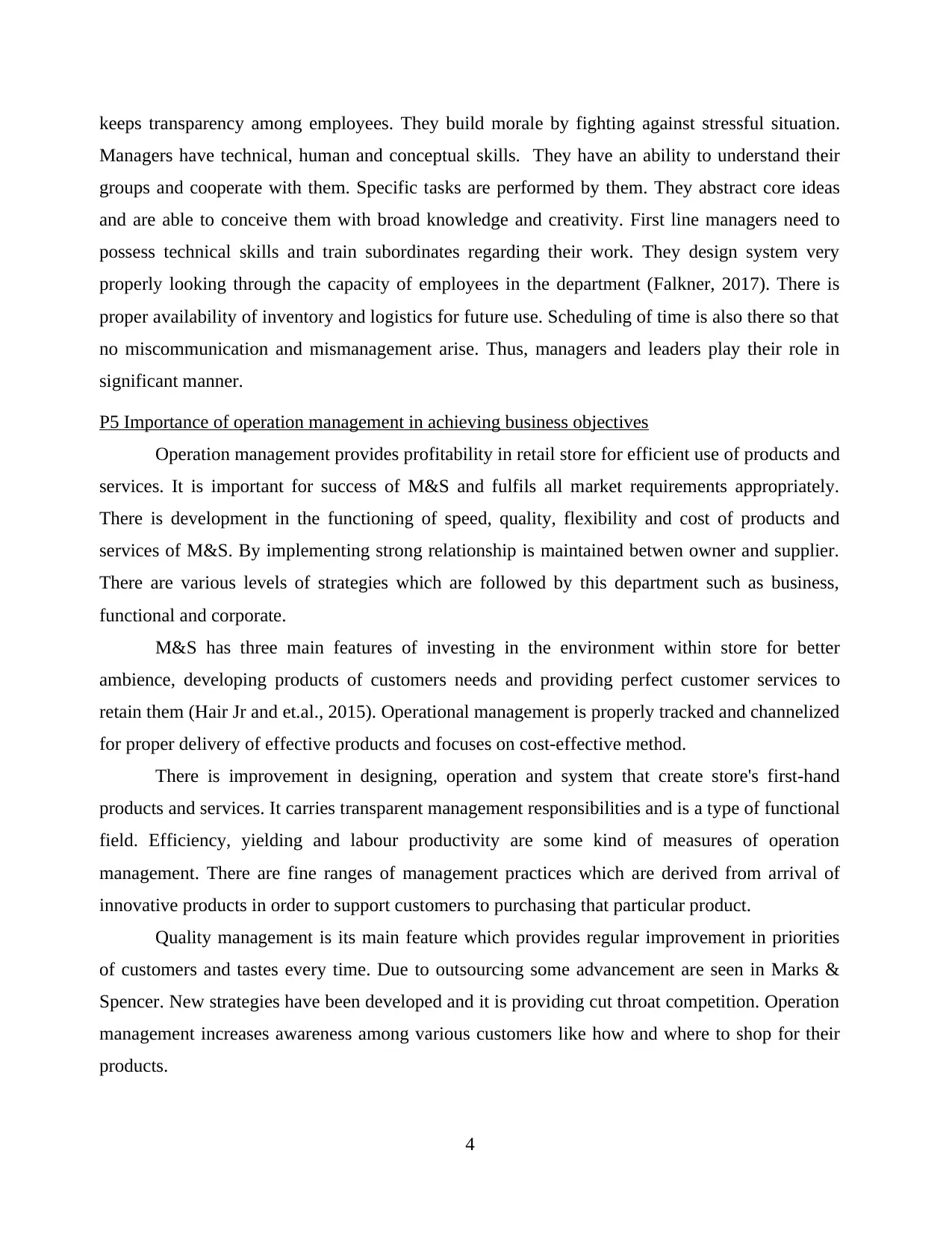
keeps transparency among employees. They build morale by fighting against stressful situation.
Managers have technical, human and conceptual skills. They have an ability to understand their
groups and cooperate with them. Specific tasks are performed by them. They abstract core ideas
and are able to conceive them with broad knowledge and creativity. First line managers need to
possess technical skills and train subordinates regarding their work. They design system very
properly looking through the capacity of employees in the department (Falkner, 2017). There is
proper availability of inventory and logistics for future use. Scheduling of time is also there so that
no miscommunication and mismanagement arise. Thus, managers and leaders play their role in
significant manner.
P5 Importance of operation management in achieving business objectives
Operation management provides profitability in retail store for efficient use of products and
services. It is important for success of M&S and fulfils all market requirements appropriately.
There is development in the functioning of speed, quality, flexibility and cost of products and
services of M&S. By implementing strong relationship is maintained betwen owner and supplier.
There are various levels of strategies which are followed by this department such as business,
functional and corporate.
M&S has three main features of investing in the environment within store for better
ambience, developing products of customers needs and providing perfect customer services to
retain them (Hair Jr and et.al., 2015). Operational management is properly tracked and channelized
for proper delivery of effective products and focuses on cost-effective method.
There is improvement in designing, operation and system that create store's first-hand
products and services. It carries transparent management responsibilities and is a type of functional
field. Efficiency, yielding and labour productivity are some kind of measures of operation
management. There are fine ranges of management practices which are derived from arrival of
innovative products in order to support customers to purchasing that particular product.
Quality management is its main feature which provides regular improvement in priorities
of customers and tastes every time. Due to outsourcing some advancement are seen in Marks &
Spencer. New strategies have been developed and it is providing cut throat competition. Operation
management increases awareness among various customers like how and where to shop for their
products.
4
Managers have technical, human and conceptual skills. They have an ability to understand their
groups and cooperate with them. Specific tasks are performed by them. They abstract core ideas
and are able to conceive them with broad knowledge and creativity. First line managers need to
possess technical skills and train subordinates regarding their work. They design system very
properly looking through the capacity of employees in the department (Falkner, 2017). There is
proper availability of inventory and logistics for future use. Scheduling of time is also there so that
no miscommunication and mismanagement arise. Thus, managers and leaders play their role in
significant manner.
P5 Importance of operation management in achieving business objectives
Operation management provides profitability in retail store for efficient use of products and
services. It is important for success of M&S and fulfils all market requirements appropriately.
There is development in the functioning of speed, quality, flexibility and cost of products and
services of M&S. By implementing strong relationship is maintained betwen owner and supplier.
There are various levels of strategies which are followed by this department such as business,
functional and corporate.
M&S has three main features of investing in the environment within store for better
ambience, developing products of customers needs and providing perfect customer services to
retain them (Hair Jr and et.al., 2015). Operational management is properly tracked and channelized
for proper delivery of effective products and focuses on cost-effective method.
There is improvement in designing, operation and system that create store's first-hand
products and services. It carries transparent management responsibilities and is a type of functional
field. Efficiency, yielding and labour productivity are some kind of measures of operation
management. There are fine ranges of management practices which are derived from arrival of
innovative products in order to support customers to purchasing that particular product.
Quality management is its main feature which provides regular improvement in priorities
of customers and tastes every time. Due to outsourcing some advancement are seen in Marks &
Spencer. New strategies have been developed and it is providing cut throat competition. Operation
management increases awareness among various customers like how and where to shop for their
products.
4
Paraphrase This Document
Need a fresh take? Get an instant paraphrase of this document with our AI Paraphraser
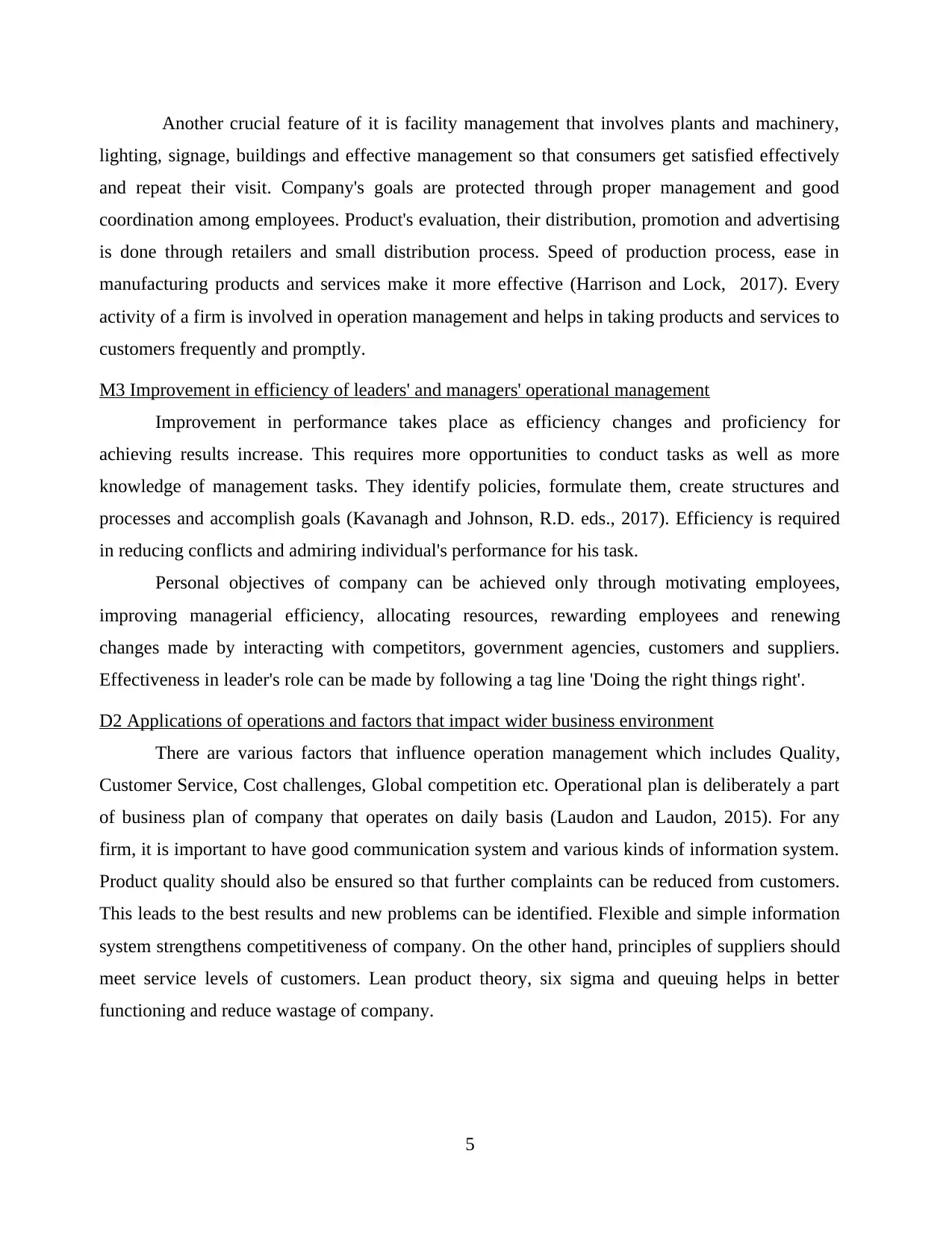
Another crucial feature of it is facility management that involves plants and machinery,
lighting, signage, buildings and effective management so that consumers get satisfied effectively
and repeat their visit. Company's goals are protected through proper management and good
coordination among employees. Product's evaluation, their distribution, promotion and advertising
is done through retailers and small distribution process. Speed of production process, ease in
manufacturing products and services make it more effective (Harrison and Lock, 2017). Every
activity of a firm is involved in operation management and helps in taking products and services to
customers frequently and promptly.
M3 Improvement in efficiency of leaders' and managers' operational management
Improvement in performance takes place as efficiency changes and proficiency for
achieving results increase. This requires more opportunities to conduct tasks as well as more
knowledge of management tasks. They identify policies, formulate them, create structures and
processes and accomplish goals (Kavanagh and Johnson, R.D. eds., 2017). Efficiency is required
in reducing conflicts and admiring individual's performance for his task.
Personal objectives of company can be achieved only through motivating employees,
improving managerial efficiency, allocating resources, rewarding employees and renewing
changes made by interacting with competitors, government agencies, customers and suppliers.
Effectiveness in leader's role can be made by following a tag line 'Doing the right things right'.
D2 Applications of operations and factors that impact wider business environment
There are various factors that influence operation management which includes Quality,
Customer Service, Cost challenges, Global competition etc. Operational plan is deliberately a part
of business plan of company that operates on daily basis (Laudon and Laudon, 2015). For any
firm, it is important to have good communication system and various kinds of information system.
Product quality should also be ensured so that further complaints can be reduced from customers.
This leads to the best results and new problems can be identified. Flexible and simple information
system strengthens competitiveness of company. On the other hand, principles of suppliers should
meet service levels of customers. Lean product theory, six sigma and queuing helps in better
functioning and reduce wastage of company.
5
lighting, signage, buildings and effective management so that consumers get satisfied effectively
and repeat their visit. Company's goals are protected through proper management and good
coordination among employees. Product's evaluation, their distribution, promotion and advertising
is done through retailers and small distribution process. Speed of production process, ease in
manufacturing products and services make it more effective (Harrison and Lock, 2017). Every
activity of a firm is involved in operation management and helps in taking products and services to
customers frequently and promptly.
M3 Improvement in efficiency of leaders' and managers' operational management
Improvement in performance takes place as efficiency changes and proficiency for
achieving results increase. This requires more opportunities to conduct tasks as well as more
knowledge of management tasks. They identify policies, formulate them, create structures and
processes and accomplish goals (Kavanagh and Johnson, R.D. eds., 2017). Efficiency is required
in reducing conflicts and admiring individual's performance for his task.
Personal objectives of company can be achieved only through motivating employees,
improving managerial efficiency, allocating resources, rewarding employees and renewing
changes made by interacting with competitors, government agencies, customers and suppliers.
Effectiveness in leader's role can be made by following a tag line 'Doing the right things right'.
D2 Applications of operations and factors that impact wider business environment
There are various factors that influence operation management which includes Quality,
Customer Service, Cost challenges, Global competition etc. Operational plan is deliberately a part
of business plan of company that operates on daily basis (Laudon and Laudon, 2015). For any
firm, it is important to have good communication system and various kinds of information system.
Product quality should also be ensured so that further complaints can be reduced from customers.
This leads to the best results and new problems can be identified. Flexible and simple information
system strengthens competitiveness of company. On the other hand, principles of suppliers should
meet service levels of customers. Lean product theory, six sigma and queuing helps in better
functioning and reduce wastage of company.
5
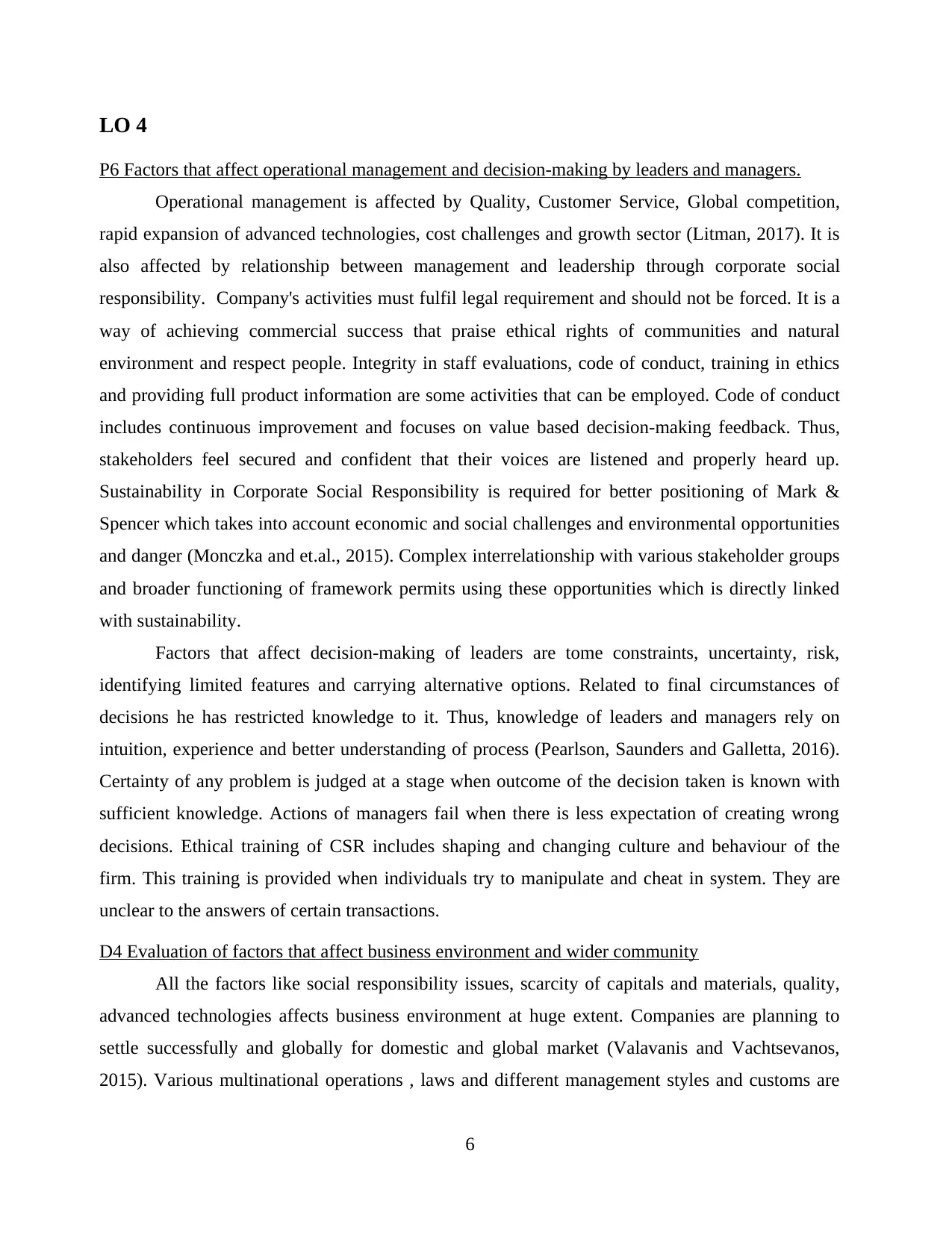
LO 4
P6 Factors that affect operational management and decision-making by leaders and managers.
Operational management is affected by Quality, Customer Service, Global competition,
rapid expansion of advanced technologies, cost challenges and growth sector (Litman, 2017). It is
also affected by relationship between management and leadership through corporate social
responsibility. Company's activities must fulfil legal requirement and should not be forced. It is a
way of achieving commercial success that praise ethical rights of communities and natural
environment and respect people. Integrity in staff evaluations, code of conduct, training in ethics
and providing full product information are some activities that can be employed. Code of conduct
includes continuous improvement and focuses on value based decision-making feedback. Thus,
stakeholders feel secured and confident that their voices are listened and properly heard up.
Sustainability in Corporate Social Responsibility is required for better positioning of Mark &
Spencer which takes into account economic and social challenges and environmental opportunities
and danger (Monczka and et.al., 2015). Complex interrelationship with various stakeholder groups
and broader functioning of framework permits using these opportunities which is directly linked
with sustainability.
Factors that affect decision-making of leaders are tome constraints, uncertainty, risk,
identifying limited features and carrying alternative options. Related to final circumstances of
decisions he has restricted knowledge to it. Thus, knowledge of leaders and managers rely on
intuition, experience and better understanding of process (Pearlson, Saunders and Galletta, 2016).
Certainty of any problem is judged at a stage when outcome of the decision taken is known with
sufficient knowledge. Actions of managers fail when there is less expectation of creating wrong
decisions. Ethical training of CSR includes shaping and changing culture and behaviour of the
firm. This training is provided when individuals try to manipulate and cheat in system. They are
unclear to the answers of certain transactions.
D4 Evaluation of factors that affect business environment and wider community
All the factors like social responsibility issues, scarcity of capitals and materials, quality,
advanced technologies affects business environment at huge extent. Companies are planning to
settle successfully and globally for domestic and global market (Valavanis and Vachtsevanos,
2015). Various multinational operations , laws and different management styles and customs are
6
P6 Factors that affect operational management and decision-making by leaders and managers.
Operational management is affected by Quality, Customer Service, Global competition,
rapid expansion of advanced technologies, cost challenges and growth sector (Litman, 2017). It is
also affected by relationship between management and leadership through corporate social
responsibility. Company's activities must fulfil legal requirement and should not be forced. It is a
way of achieving commercial success that praise ethical rights of communities and natural
environment and respect people. Integrity in staff evaluations, code of conduct, training in ethics
and providing full product information are some activities that can be employed. Code of conduct
includes continuous improvement and focuses on value based decision-making feedback. Thus,
stakeholders feel secured and confident that their voices are listened and properly heard up.
Sustainability in Corporate Social Responsibility is required for better positioning of Mark &
Spencer which takes into account economic and social challenges and environmental opportunities
and danger (Monczka and et.al., 2015). Complex interrelationship with various stakeholder groups
and broader functioning of framework permits using these opportunities which is directly linked
with sustainability.
Factors that affect decision-making of leaders are tome constraints, uncertainty, risk,
identifying limited features and carrying alternative options. Related to final circumstances of
decisions he has restricted knowledge to it. Thus, knowledge of leaders and managers rely on
intuition, experience and better understanding of process (Pearlson, Saunders and Galletta, 2016).
Certainty of any problem is judged at a stage when outcome of the decision taken is known with
sufficient knowledge. Actions of managers fail when there is less expectation of creating wrong
decisions. Ethical training of CSR includes shaping and changing culture and behaviour of the
firm. This training is provided when individuals try to manipulate and cheat in system. They are
unclear to the answers of certain transactions.
D4 Evaluation of factors that affect business environment and wider community
All the factors like social responsibility issues, scarcity of capitals and materials, quality,
advanced technologies affects business environment at huge extent. Companies are planning to
settle successfully and globally for domestic and global market (Valavanis and Vachtsevanos,
2015). Various multinational operations , laws and different management styles and customs are
6
⊘ This is a preview!⊘
Do you want full access?
Subscribe today to unlock all pages.

Trusted by 1+ million students worldwide
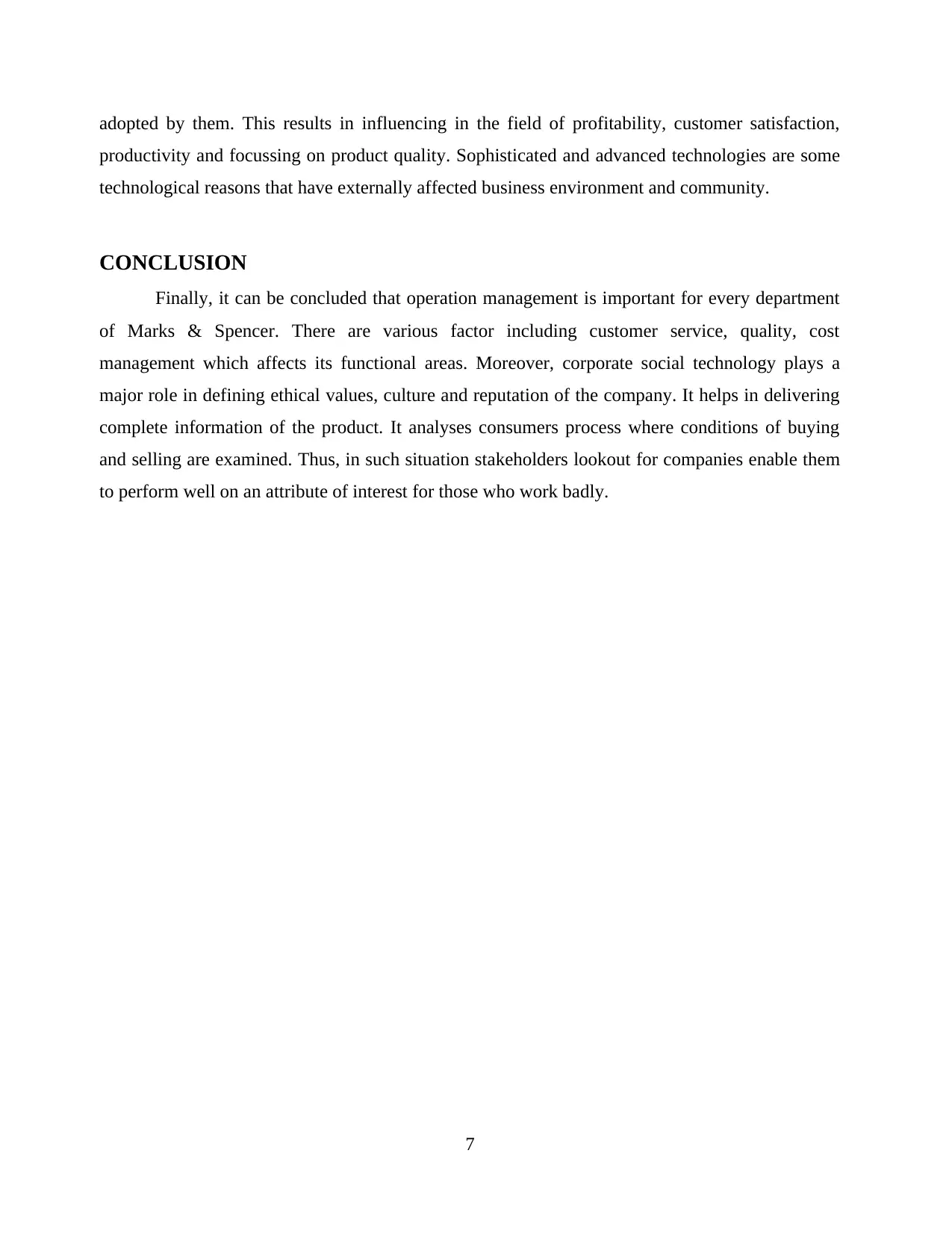
adopted by them. This results in influencing in the field of profitability, customer satisfaction,
productivity and focussing on product quality. Sophisticated and advanced technologies are some
technological reasons that have externally affected business environment and community.
CONCLUSION
Finally, it can be concluded that operation management is important for every department
of Marks & Spencer. There are various factor including customer service, quality, cost
management which affects its functional areas. Moreover, corporate social technology plays a
major role in defining ethical values, culture and reputation of the company. It helps in delivering
complete information of the product. It analyses consumers process where conditions of buying
and selling are examined. Thus, in such situation stakeholders lookout for companies enable them
to perform well on an attribute of interest for those who work badly.
7
productivity and focussing on product quality. Sophisticated and advanced technologies are some
technological reasons that have externally affected business environment and community.
CONCLUSION
Finally, it can be concluded that operation management is important for every department
of Marks & Spencer. There are various factor including customer service, quality, cost
management which affects its functional areas. Moreover, corporate social technology plays a
major role in defining ethical values, culture and reputation of the company. It helps in delivering
complete information of the product. It analyses consumers process where conditions of buying
and selling are examined. Thus, in such situation stakeholders lookout for companies enable them
to perform well on an attribute of interest for those who work badly.
7
Paraphrase This Document
Need a fresh take? Get an instant paraphrase of this document with our AI Paraphraser
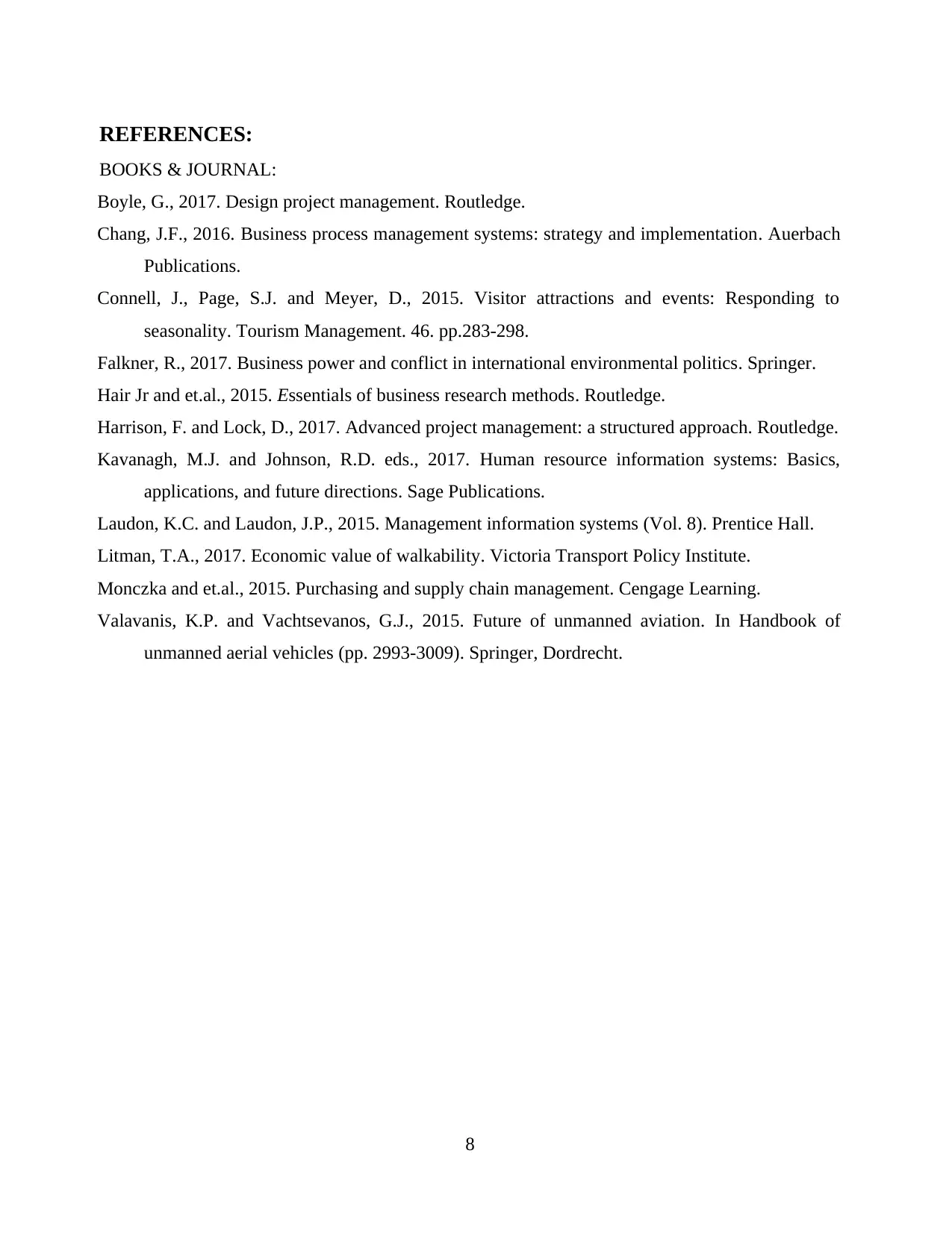
REFERENCES:
BOOKS & JOURNAL:
Boyle, G., 2017. Design project management. Routledge.
Chang, J.F., 2016. Business process management systems: strategy and implementation. Auerbach
Publications.
Connell, J., Page, S.J. and Meyer, D., 2015. Visitor attractions and events: Responding to
seasonality. Tourism Management. 46. pp.283-298.
Falkner, R., 2017. Business power and conflict in international environmental politics. Springer.
Hair Jr and et.al., 2015. Essentials of business research methods. Routledge.
Harrison, F. and Lock, D., 2017. Advanced project management: a structured approach. Routledge.
Kavanagh, M.J. and Johnson, R.D. eds., 2017. Human resource information systems: Basics,
applications, and future directions. Sage Publications.
Laudon, K.C. and Laudon, J.P., 2015. Management information systems (Vol. 8). Prentice Hall.
Litman, T.A., 2017. Economic value of walkability. Victoria Transport Policy Institute.
Monczka and et.al., 2015. Purchasing and supply chain management. Cengage Learning.
Valavanis, K.P. and Vachtsevanos, G.J., 2015. Future of unmanned aviation. In Handbook of
unmanned aerial vehicles (pp. 2993-3009). Springer, Dordrecht.
8
BOOKS & JOURNAL:
Boyle, G., 2017. Design project management. Routledge.
Chang, J.F., 2016. Business process management systems: strategy and implementation. Auerbach
Publications.
Connell, J., Page, S.J. and Meyer, D., 2015. Visitor attractions and events: Responding to
seasonality. Tourism Management. 46. pp.283-298.
Falkner, R., 2017. Business power and conflict in international environmental politics. Springer.
Hair Jr and et.al., 2015. Essentials of business research methods. Routledge.
Harrison, F. and Lock, D., 2017. Advanced project management: a structured approach. Routledge.
Kavanagh, M.J. and Johnson, R.D. eds., 2017. Human resource information systems: Basics,
applications, and future directions. Sage Publications.
Laudon, K.C. and Laudon, J.P., 2015. Management information systems (Vol. 8). Prentice Hall.
Litman, T.A., 2017. Economic value of walkability. Victoria Transport Policy Institute.
Monczka and et.al., 2015. Purchasing and supply chain management. Cengage Learning.
Valavanis, K.P. and Vachtsevanos, G.J., 2015. Future of unmanned aviation. In Handbook of
unmanned aerial vehicles (pp. 2993-3009). Springer, Dordrecht.
8
1 out of 8
Related Documents
Your All-in-One AI-Powered Toolkit for Academic Success.
+13062052269
info@desklib.com
Available 24*7 on WhatsApp / Email
![[object Object]](/_next/static/media/star-bottom.7253800d.svg)
Unlock your academic potential
Copyright © 2020–2026 A2Z Services. All Rights Reserved. Developed and managed by ZUCOL.



